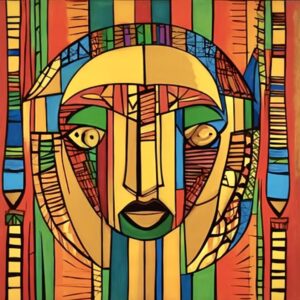The Kuenyehia Prize recognizes and honors
The region’s most exceptional talents aged 25 to 40 in West Africa receive recognition. The winners and runners-up gain access to monetary awards, resources for improving their craft, as well as increased visibility via connections fostered by the Kuenyehia Trust.
The recognition bestowed upon artists through the Prize offers them a rapid career advancement, immediate monetary benefits, as well as local and international opportunities.
This year, the award drew entries from 217 artists, among whom these finalists (without any specific ranking) have been selected:
- Ephraim Udoka, Nigeria
- Ezra Appiah, Ghana
- Moses Adjei, Ghana
- Segun Fagorosi, Nigeria
- Tosin Toromadi, Nigeria
- Adulphina Imude, Nigeria
- Alassane Sy, Senegal
- Chinecherem Peace, Nigeria
- Djibril Coulibaly, Senegal
- Burgundy Sena Apau, Ghana
- Ismael Mahamadou Laouali, Niger
- Oluwatosin Popoola, Nigeria
- Prosper Aluu, Nigeria
- Yusuf Olayinka, Nigeria
- Zahui Yvann, Ivory Coast
The success of an African visual artist, no matter how talented, is like a lottery. The odds are stacked against him with a near improbable chance of succeeding.
Art patrons and supporters within institutions are scarce, resulting in a limited marketplace for African art.
The few galleries and exhibition spaces that exist tend to be small, difficult to get into and concentrated largely in the capital cities. National art institutions have been underfunded over the years with many now in a deplorable state.
Many nations do not possess a comprehensive national art collection. Despite some progress made over the past decade, the harsh truth remains that artists often struggle with limited access to galleries, collectors, and chances for exhibitions. Consequently, they miss out on potential earnings from their artistic abilities. Moreover, there’s a gap between the arts education provided and what is actually required in the industry, further exacerbating this issue.
Schools offer resources, and the vibrant art community implies that even though formally trained artists get proper technical instruction, they frequently lack understanding of the business side of art, the international art market, or the broader artistic landscape.
The basics of the art industry are essential to understand. Consequently, it’s not surprising that many emerging artists, struggling to establish viable careers in art, often put away their brushes and explore different professional paths. However, the impact of art on economic growth is undeniable.
The worldwide art market expanded to $67.8 billion in 2022, surpassing pre-pandemic figures1. Art plays a significant role in fostering essential critical thinking abilities.
recognized in the international education sector as part of an extensive shift moving towards STEAM (Science, Technology, Engineering, Arts, and Mathematics) from the traditional STEM approach.
Paradoxically, over the past 15 years, we’ve witnessed an unparalleled rise in African art on the global scene, with those artists managing to breakthrough achieving enormous wealth.
Given adequate support and access to various opportunities, numerous young African artists have the potential to measure up against the finest talents globally and establish financially lucrative long-term careers in the arts.
This could enable numerous additional African artists and their economies to partake in and profit from the resurgence of African art.
In light of these circumstances, Professor Elikem Nutifafa Kuenyehia established the Kuenyehia
The Trust for Contemporary Art in 2014 aimed to achieve the following goals:
- Promote and advance contemporary
African art.
- Support young, emerging, and mid-career African artists.
- Contribute to the development of a vibrant local and international market for African art.
- Advance education in visual arts in Africa and
- Invest or co-invest in enterprises that advance the promotion and development of the creative arts.
In furtherance of its objectives, the has developed a number of programs and initiatives the thought leadership seminars – telling tall stories – which contribute efforts to refocus intentional attention on art policy and practice in Ghana. Past discussions have centered on:
- The part played by the arts in shaping culture and fostering nation-building.
- The duty of the African artist in confronting African stereotypes.
- Eating Together: The Role of Arts and Cultural Entrepreneurs in Developing Ghana.
Panelists from different facets of the arts have included musician and cultural icon, Okyeame Kwame; veteran actress, cultural activist and former deputy minister of tourism, culture and creative arts, Dzifa Gomashie; Selassie Atadika, chef and founder of Midunu, Sefa Gohoho-Boatin, founder, Untamed Empire.
Provided by SyndiGate Media Inc.
Syndigate.info
).
